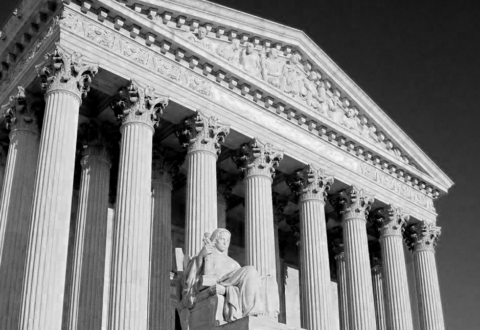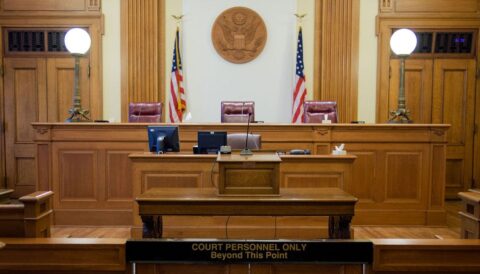Immigration at the Border

Does U.S. Attorney Nomination Send a Mixed Signal on Immigration?
While the Obama administration has spent the past year discussing its plans to reform our broken immigration system, it is the day to day actions that, at times, draw a stark contrast to the hope and promise of a new strategy on U.S. immigration. The nomination of Stephanie Rose to lead the U.S. Attorney’s Office for the Northern District of Iowa seems like a mixed signal to immigration reformers. Rose’s 12-year career in the U.S. Attorney’s office was most notably marked by her role as lead prosecutor on the largest (and most controversial) immigration worksite enforcement in U.S. history. Read More

Supreme Court Hears Case about Immigrants’ Access to Federal Court Review
Last week, the Supreme Court heard arguments in a case that involves an important safeguard for immigrants facing removal from the United States—access to federal court review. The case, Kucana v. Holder, was brought by an asylum seeker from Albania. Mr. Kucana is seeking court review of a government decision depriving him of the opportunity to present his asylum claim. The Seventh Circuit Court of Appeals (based in Chicago) refused to review the government’s decision. Instead, the Seventh Circuit found that in his case, the government has unfettered discretion over a potentially life and death decision. The Supreme Court now is considering whether the Seventh Circuit was right. Read More

Secretary Napolitano Makes First Speech on Immigration Reform
Department of Homeland Security Secretary Janet Napolitano’s speech today at the Center for American Progress (CAP) will probably be remembered as a key moment in the history of immigration reform. The Secretary not only expressed support for a comprehensive overhaul of our immigration system, she also made it clear that it is an imperative for the ultimate security of the United States. Read More

Two Legal Immigrants Unjustly Detained by Immigration and Customs Enforcement (ICE)
Over the past several months, the Department of Homeland Security (DHS) has made concerted efforts to overhaul our flawed immigration detention system—aiming for more transparency and broadened federal oversight. Deserving of equal attention, however, is Immigration and Customs Enforcement’s (ICE) loose enforcement policy, which also ensnares legal immigrants. Read More

Would Mass Deportation Mean More Jobs for U.S. Workers?
As the U.S. experiences its highest unemployment levels in a generation and news reports document the desperation of some native-born workers who are unable to find steady work, we must ask the question whether now is really the best time to implement a legalization program. Basic math would suggest that 16 million unemployed American workers would benefit from subtracting 12 million undocumented workers from the labor force. However, it isn’t that easy. Mass deportation is no silver bullet for solving our unemployment problem. Our economic and unemployment issues are not a matter of simple math or a zero sum game. In reality, American workers and recent immigrants workers are not easily interchangeable and removing millions of workers and consumers from our fragile economy would only make matters worse. Read More

Report Highlights Need for Appointed Counsel for Detainees Facing Removal
A report issued this week by the City Bar Justice Center highlights one of the most serious flaws of the removal process: noncitizens are not appointed a lawyer to represent them. The report focuses on the efforts of the City Bar Justice Center and other nonprofit organizations to increase access to legal counsel at the Varick Federal Detention Facility in Manhattan. According to the report, a significant portion of the detainees housed at Varick had possible meritorious claims to relief from removal, such as asylum or an avenue for obtaining a green card. Read More

Restrictionist “Experts” Get It Wrong Again with 287(g) Assessment
In October, the restrictionist group Center for Immigration Studies (CIS) released another report singing the praises of the 287(g) program. In The 287(g) Program: Protecting Home Towns and Homeland, the authors ignore the evidence and arguments put forward by law enforcement experts—such as the Police Foundation, the Major Cities Chiefs Association, and the International Association of Chiefs of Police—and dismisses them as “national advocacy organizations.” In doing so, CIS puts itself forward as apparent “law enforcement experts,” adding to their impressive resume that includes biblical scholar and environmental expert. Read More

Board of Immigration Appeals Rules Not to Reopen Old Deportation Cases
A decision by the Board of Immigration Appeals (BIA) last week provides yet more evidence that broken laws create broken government. By refusing to protect eligible applicants for adjustment of status from deportation, the Board eased the way for the Immigration and Customs Enforcement (ICE) to deport someone whose legitimate green card application is pending with United States Citizenship and Immigration Services (USCIS). Read More

New Report Details the Chilling Effects of Immigration Enforcement on Workers’ Rights
ICED OUT: How Immigration Enforcement Has Interfered with Workers' Rights, a new publication by the AFL-CIO, American Rights at Work Education Fund, and the National Employment Law Project (NELP), tells the often ignored story of our country's broken immigration system and the collateral damage immigrants and U.S. workers experience when Immigration and Customs Enforcement (ICE) prioritize enforcement over workers' rights. Read More

Help Wanted: Broken Immigration Policies Equal Broken Government Responses
This past week, ImmigrationImpact highlighted aspects of a recent Immigration Policy Center (IPC) report, Breaking Down the Problems, What’s Wrong With our Immigration System?. The report highlights the problems faced by American families, businesses, and workers, all caught in a broken immigration system. But the report also addresses the long-term effect of our broken immigration laws on government. Put simply, broken laws equal broken government. Read More
Make a contribution
Make a direct impact on the lives of immigrants.
